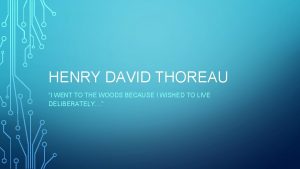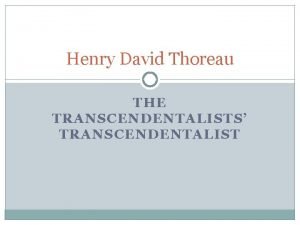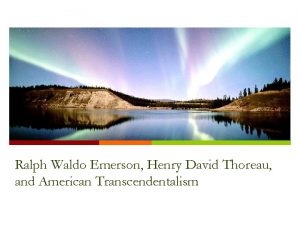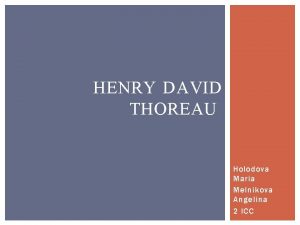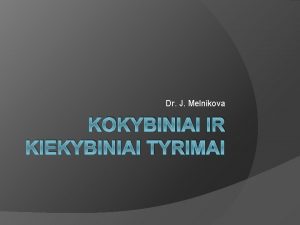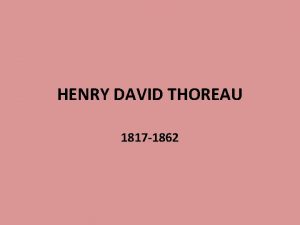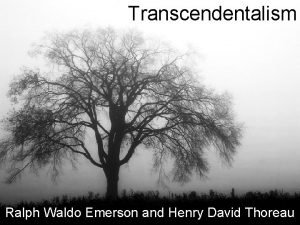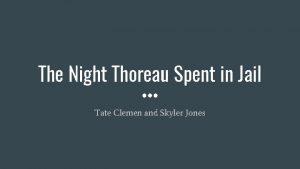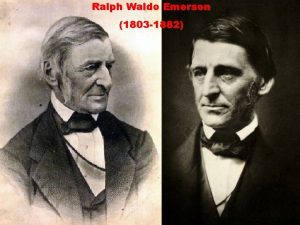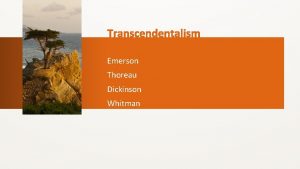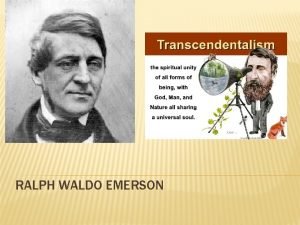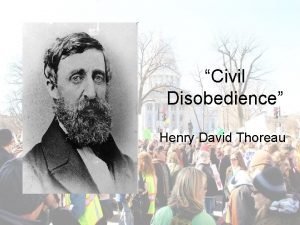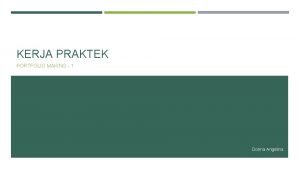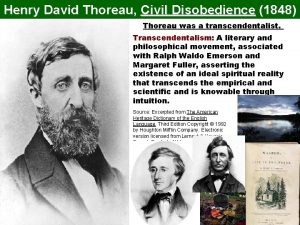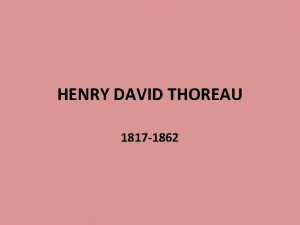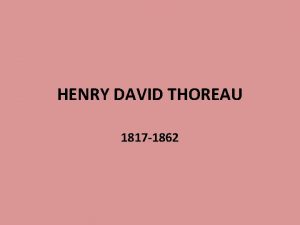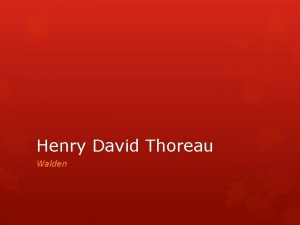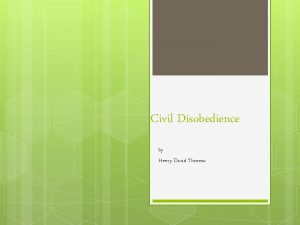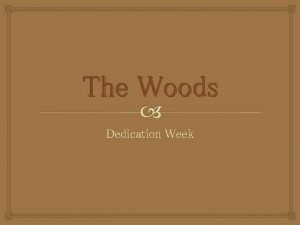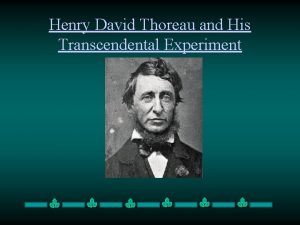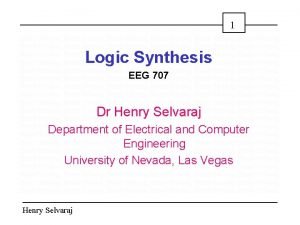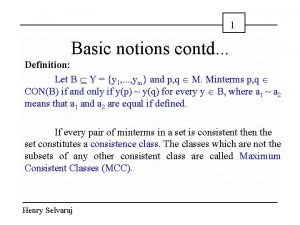HENRY DAVID THOREAU Holodova Maria Melnikova Angelina 2















- Slides: 15

HENRY DAVID THOREAU Holodova Maria Melnikova Angelina 2 ICC

BIOGRAPHY Henry David Thoreau was born on July 12, 1817, in Concord, Massachusetts. He was raised along with his older siblings John and Helen and younger sister Sophia. His father operated a local pencil factory, and his mother rented out parts of the family's home to boarders. Thoreau went to Harvard College, studied Greek and Latin as well as German. He graduated from college in 1837. With his brother John, he set up a school in 1838. Thoreau then went to work for his father for a time. After college, Thoreau befriended writer and fellow Concord resident Ralph Waldo Emerson. Through Emerson, he became exposed to Transcendentalism, a school of thought that emphasized the importance of empirical thinking and of spiritual matters over the physical world. Emerson acted as a mentor to Thoreau and supported him in many ways. Thoreau's birthplace, the Wheeler-Minot Farmhouse in Concord, Massachusetts

BIOGRAPHY Some of Thoreau's first works were published in The Dial, a Transcendentalist magazine. In 1845, Thoreau built a small home for himself on Walden Pond, on property owned by Emerson. His schedule gave him plenty of time to devote to his philosophical and literary interests. Published in 1854, Walden; or, Life in the Woods espoused living a life close to nature. His best-known and most influential essays, "Civil Disobedience" (also known as "Resistance to Civil Government") "The only obligation which I have a right to assume is to do at any time what I think right, " he wrote. Thoreau also remained a devoted abolitionist until the end of his life. He wrote several works, including the 1854 essay "Slavery in Massachusetts. " In his later years, Thoreau battled an illness tuberculosis that had plagued him for decades. To restore his health, Thoreau went to Minnesota in 1861. He finally succumbed to the disease on May 6, 1862.

CIVIL DISOBEDIENCE Resistance to Civil Government (Civil Disobedience) is an essay, first published in 1849. Thoreau argues that individuals should not permit governments to overrule or atrophy their consciences, and that they have a duty to avoid allowing such acquiescence to enable the government to make them the agents of injustice. The term “civil”: in this case it is "relating to citizens and their interrelations with one another or with the state", and so “civil disobedience” means "disobedience to the state" Thoreau opens Civil Disobedience with the maxim "That government is best which governs least, " and he speaks in favor of government that does not intrude upon men's lives. Government is only an expedient — a means of attaining an end. It exists because the people have chosen it to execute their will, but it is susceptible to misuse. Thoreau asserts that government as an institution hinders the accomplishment of the work for which it was created.

CIVIL DISOBEDIENCE He deplores the lack of judg ment, moral sense, and conscienc e i n the way me n serve the state. A man can not bow unquestioningly to the sta te' s aut hor it y w ithout disregarding himself. Tho reau writes, "Must the cit izen ever for a moment, or in the le ast de gre e, resign his c o nscience to the legislator? Why has every man a co nsci enc e, the n? I t hin k we sho uld be men firs t, and subjects afterward. " Having developed the image of the government as a machine tha t ma y or may no t d o e nough go od to counter balance what evil it commits, he urge s re be ll io n. Tho reau declared that “If the government requires you to be the age nt o f i njust ic e t o an other , then, I say, break the law. ” Wron g will b e redressed on ly by the individual, not through the mec hani sm of g o vernment. The individual m ust not support the structure o f go ve rnme nt, must a ct with princ iple, must break the law if necessary. Abo lition can be achieved by withdrawing support from the gov er nment , whi ch m ay b e acco mplished prac tically through the nonpayment of taxe s. Tho reau comments on the cor rupting influence of money and pro pe rt y, a nd ur ges a simple, self-reliant lifestyle as a means of maintaining indiv i dua l f re ed om. His emphasis at the end of t he essay is firmly on respect fo r the ind iv id ual. T her e w ill n ever b e a "really free and enlightened State" until the sta te re co gnize s the p ree minence o f the individual.

1. “If the injustice is part of the necessary friction of the machine of government, let it go: perchance it will wear smooth—certainly the machine will wear out. If the injustice has a spring, or a pulley, or a rope, or a crank, exclusively for itself, then perhaps you may consider whether the remedy will not be worse than the evil; but if it is of such a nature that it requires you to be the agent of injustice to another, then I say, break the law. Let your life be a counter-friction to stop the machine. What I have to do is to see, at any rate, that I do not lend myself to the wrong which I condemn. ” 2. “ I know this well, that if one thousand, if one hundred, if ten men whom I could name, —if ten honest men only, —aye, if one HONEST man, in this State of Massachusetts, ceasing to hold slaves, were actually to withdraw from this copartnership, and be locked up in the county jail therefor, it would be the abolition of slavery in America. ”

HENRY DAVID THOREAU While other writers from his time have faded into obscurity, Thoreau has endured because so much of what he wrote about is still relevant today. His writings on government were revolutionary, with some calling him an early anarchist. “Thoreau was a great writer, philosopher, poet, and withal a most practical man, that is, he taught nothing he was not prepared to practice in himself. He was one of the greatest and most moral men America has produced. At the time of the abolition of slavery movement, he wrote his famous essay On the Duty of Civil Disobedience. He went to gaol for the sake of his principles and suffering humanity. His essay has, therefore, been sanctified by suffering. Moreover, it is written for all time. Its incisive logic is unanswerable. ” – Mohandas Gandhi.

He knew the country like a fox or a bird and passed through it as freely by paths of his own. Under his arm he carried an old musicbook to press plants; in his pocket his diary and pencil, a spy-glass for birds, microscope, jack-knife and twine. He wore straw hat, stout shoes, strong gray trousers, to brave shrub-oaks and smilax, and to climb a tree for a hawk's or squirrel's nest. He waded into the pool for the water-plants, and his strong legs were no insignificant part of his armor. His power of observation seemed to indicate additional senses. He saw as with microscope, heard as with ear-trumpet, and his memory was a photographic register of all he saw and heard. Every fact lay in glory in his mind, a type of the order and beauty of the whole. His intimacy with animals suggested… that `either he had told the bees things, or the bees had told him. ' Snakes coiled round his leg, the fishes swam into his hand, and he took them out of the water; he pulled the woodchuck out of its hole by the tail, and took the foxes under his protection from the hunters. From the Biographical Sketch by R. W. Emerson

THE WALDEN YEARS On July 4, 1845, Thoreau embarked on a two-year experiment in simple living starting when he moved to a small house he had built on land owned by Emerson in a forest around the shores of Walden Pond. Independence Day has symbolic meaning as the day Thoreau becomes self-reliant and the day that he becomes one of nature's inhabitants. On July 24, 1846, Thoreau refused to pay six years of delinquent poll taxes because of his opposition to the Mexican–American War and slavery, and he spent a night in jail. He left the house on September 6, 1847.

WALDEN, OR LIFE IN THE WOODS The work is part personal declaration of independence, social experiment, voyage of spiritual discovery, satire, and to some degree a manual for self-reliance. Thoreau makes precise scientific observations of nature as well as metaphorical and poetic uses of natural phenomena. He identifies many plants and animals by both their popular and scientific names, records in detail the color and clarity of different bodies of water, precisely dates and describes the freezing and thawing of the pond, and recounts his experiments to measure the depth and shape of the bottom of the supposedly "bottomless" Walden Pond.

WALDEN, OR LIFE IN THE WOODS The book is separated into specific chapters, each of which focuses on specific themes Thoreau understood nature as a direct manifestation of deity and spirituality. He tried to listen to "the language all things and all events speak" and to see God in nature. He found life and the passage of time to be richer and more fulfilling during his life in nature than during his life in artificially constructed, modern cultural environments that were "restless, nervous, bustling, and trivial. " Life in modern culture was indeed spent, even wasted, on trivial matters arising from "needs" generated by people themselves.

WALDEN, OR LIFE IN THE WOODS Self -re lianc e : Thore au con stantly refuses to be in "need" of the companionship of othe rs. Though he realiz es its significance and importance, he thinks it unn ecessary to always be in search for it. Self-reliance, to hi m, is economic an d social and is a princi ple that in terms of financial and i nterpersonal rela tio ns is more valuable than anything. To Thoreau, self-rel iance can be both spirit ual as we ll as economic. Simpl icit y : Thoreau constantly seeks to simplify his lifestyle: he patches his clo th es rathe r than buy new ones, he minimizes his consum er activity, and relie s on leisure time and on himself for everything. Progress : In a world where everyone and everything is eager to advance in terms o f pro gre ss, Thoreau finds it stubborn and skeptical to think that any outw ard improve me nt of life can bring inner peace and contentment. The n ee d fo r spiritual awakening: Spiritual awakening is the way to find and rea l ize the truths of life which are often buried under the mo unds of daily aff airs. It is the source fr om w hich all of the other themes fl ow. Me ditat ion : Thoreau was an avid meditator and often spoke about the benefits of me dit ating. Man as part of nature Na ture and its re fle ction of human emotions The st at e as unjust and corr up t

GREEN ANARCHISM § Is a school of thought within anarchism which puts a particular emphasis on environmental issues. Civilization: § The green anarchist critique focuses on the institutions of domination, which are inherently destructive and exploitative (to humans and the environment), make up society, all grouped under the broad term "civilization". Therefore, they cannot be reformed into anything better. § This movement generally rejects furthering their cause through current political lines, favoring direct and autonomous action, sabotage, insurrection, bioregionalism, and reconnecting with the wild to create meaningful change.

GREEN ANARCHISM Technology : § There is no "neutral" form of technology as things are always created in a certain context with certain aims and functions. § Green technology is rejected as an attempt to reform this exploitative system, merely changing it on the surface to make it seem environmentally friendly, despite sustained levels of human and natural exploitation. § In place of modern technology, green anarchists favor small-scale technology, using more sustainable and local resources. Veganism: § Some green anarchists see veganism as an intrinsic part of the struggle for a free, healthy way of life. Veganarchism is the political philosophy of veganism (more specifically animal liberation) and green anarchism, creating a combined praxis as a means for social revolution. This encompasses viewing the state as unnecessary and harmful to animals, both human and non-human, whilst practising a vegan diet.

THANKS FOR YOUR ATTENTION!
 What did fireside poets write about
What did fireside poets write about Why does thoreau leave the woods
Why does thoreau leave the woods Henry david thoreau education
Henry david thoreau education Ralph waldo emerson and henry david thoreau
Ralph waldo emerson and henry david thoreau Marija holodova
Marija holodova Kiekybinis ir kokybinis tyrimas
Kiekybinis ir kokybinis tyrimas Thoreau
Thoreau Thoreau
Thoreau Die wahre meines täglichen lebens
Die wahre meines täglichen lebens The night thoreau spent in jail characters
The night thoreau spent in jail characters Thoreau self reliance quotes
Thoreau self reliance quotes Transcendentalism whitman
Transcendentalism whitman Thoreau quotes self reliance
Thoreau quotes self reliance How does thoreau respond to being jailed
How does thoreau respond to being jailed Mydesk unife docenti
Mydesk unife docenti Canva.com
Canva.com

